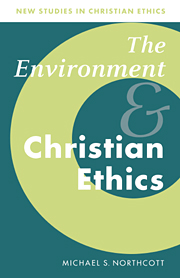Book contents
- Frontmatter
- Contents
- General editor's preface
- Preface
- Acknowledgements
- 1 Frogs, floods and famines
- 2 The origins of the environmental crisis
- 3 The turn to nature
- 4 The flowering of ecotheology
- 5 The order of creation
- 6 Creation, redemption and natural law ethics
- 7 Natural law and ecological society
- Notes
- Index
- New Studies in Christian Ethics
Preface
Published online by Cambridge University Press: 07 October 2009
- Frontmatter
- Contents
- General editor's preface
- Preface
- Acknowledgements
- 1 Frogs, floods and famines
- 2 The origins of the environmental crisis
- 3 The turn to nature
- 4 The flowering of ecotheology
- 5 The order of creation
- 6 Creation, redemption and natural law ethics
- 7 Natural law and ecological society
- Notes
- Index
- New Studies in Christian Ethics
Summary
In the three years in which I worked on this book the environment moved in and out of the frame of public debate in Britain. In 1992, when I began, it was much in the frame, particularly during and after the Rio Earth Summit. In 1995 as I write this acknowledgement, the idea that Western civilisation faces an environmental crisis is much less in public view. More commonly people are exercised by the crises in employment and in human moral ecology which are manifest in recent developments in Britain and beyond. In this book I argue that the environmental crisis is intricately connected with the human crises of moral ecology and of unemployment, and that the demise of economic justice and moral purposiveness in the global order is directly related to the increasing pace of environmental breakdown. Consequently the reorientation of modern societies towards the biological limits of the planet will not be achieved without a related quest for justice and the common good in human affairs. I also propose that vital resources for both projects may be found in an ecological repristination of central features of the Hebrew–Christian tradition, including the Hebrew vision of created order, the Christian understanding of the Trinitarian creator and incarnate redeemer, and natural law ethics, a tradition of ethics also manifest in classical and Eastern religious thought.
The theological orientation which underlies this book has been formed in a range of contexts; in experiments in alternative living in various Christian communities and churches, not least Saint Margaret's Church in Durham, and in my studies at departments of theology, religion and ethics respectively at the Universities of Durham, Sunderland and Edinburgh, and at the Seminari Theologi Malaysia in Kuala Lumpur.
- Type
- Chapter
- Information
- The Environment and Christian Ethics , pp. xiii - xvPublisher: Cambridge University PressPrint publication year: 1996

